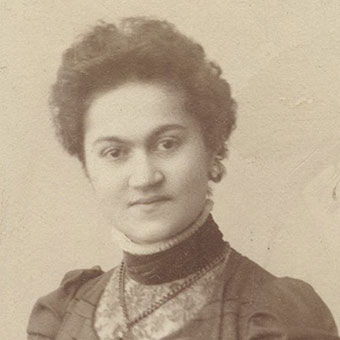
Leokadiya Kashperova
d. 1940, Moscow
Leokadiya Kashperova (1872-1940)
Biography
Until recently Leokadiya Kashperova’s reputation rested uniquely upon Stravinsky’s portrayal of her as his piano teacher, in his autobiography (Chronique de ma vie, 1935) and via later comments. Significantly, a decade after his reinvention as a neoclassical composer – a process supported by several challenging compositions for piano – Stravinsky expresses gratitude to Kashperova for providing him with an excellent piano technique and a sense of métier. Here, he is surely referring to the double profession of composer and pianist, for Kashperova was Stravinsky’s first mentor in this regard. She taught him for two years between 1899 and 1901 during which time she composed and premiered her Piano Concerto while regularly visiting the Stravinsky family apartment on the Kryukov Canal.
Kashperova was a respected figure in St Petersburg for two decades (c1895–1916), giving piano recitals, appearing in chamber music series, hosting regular musical evenings at her apartment on Tuesdays in the manner of the more celebrated ‘Korsakov’s Wednesdays’; in 1907 she undertook concert tours to Berlin and London (twice). Her music was well-known to concert audiences in Russia and beyond. But, inescapably, her life was upended by the Revolution of 1917. Thereafter, the accumulated impact of civil strife, two world wars and the constantly shifting sands of Soviet cultural policy condemned her to becoming a neglected footnote to Russia’s musical history. Effectively, after her death in 1940, her biography and her remarkable music were completely forgotten, even in Russia. However, recent research demonstrates that Kashperova deserves to be remembered as much more than ‘Stravinsky’s piano teacher’: she was primarily a composer-pianist of extraordinary talent. Her catalogue testifies to over fifty years’ creativity and establishes her as one of the very earliest female Russian composers of international stature.
Leokadiya Kashperova* was born on 4 (16) May 1872 in rural Lyubim, not far from the historic city of Yaroslavl. She graduated twice from the St Petersburg Conservatoire: firstly, in 1893 as a member of Anton Rubinstein’s elite piano class when she was regarded (according to a concert review of 20 November 1895 in Mährisches Tagblatt, one of St Petersburg’s German-language newspapers) as die Allerbegabteste, ‘the most gifted of them all’, and won the prestigious Schröder Piano Competition. She graduated again in 1895 in composition as a student of Nikolai Solovyov. Over the next twenty years all her major works were premiered, and many were published: a symphony, piano concerto, choral works, piano trios, cello sonatas, piano solos, and art-songs. In 1916 Kashperova’s professional ascendency was interrupted by her impulsive, indeed unlikely, marriage to her pupil Sergei Andropov (a Bolshevik revolutionary and close associate of Lenin) who engineered their flight from Petrograd to the relative safety of his family in the Caucasus. After her arrival in Moscow in 1920 Kashperova was occasionally invited to perform the grand sonatas of Glazunov and Balakirev, with whom she had been closely associated in St Petersburg, but her own music was not in demand. There is evidence, however, that she continued to compose. A collection of manuscripts dating from this final period is held at the Russian National Museum of Music in Moscow.
As a pianist Kashperova was known for her complete dominance of the keyboard while her fine tone-quality was also widely acknowledged. Monika Hunnius would recall, twenty years after their meeting, that ‘whenever she plays, it sounds as if every musical note she touches is born that very instant’. Kashperova’s compositions, too, were praised for revealing, as Yastrebtsev commented to Rimsky-Korsakov in 1906, ‘an uncommon musicality’. The Russian Musical Gazette noted appreciatively in 1912 that ‘her gifts as a composer are a most welcome phenomenon of St Petersburg’s musical life.’ The Sunday Times (London, 1907) observed that ‘Mlle Kashperova’s music shows a decided talent, very attractive in its tunefulness, grace and Russian fitfulness of mood’. After a century of neglect, this once-celebrated but long-forgotten composer awaits re-discovery.
*KashPERova is pronounced with emphasis on the second syllable.
© Dr Graham Griffiths
Editor of the Boosey & Hawkes Kashperova Edition
June 2020
This biography is available for reproduction in programme notes and promotional material, with full credit to the author.
